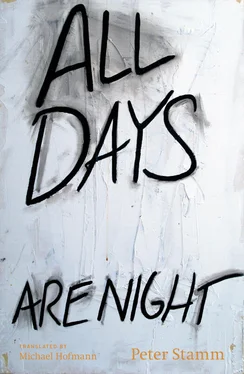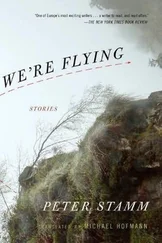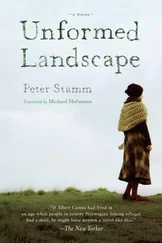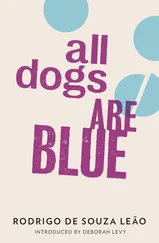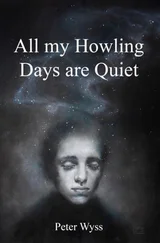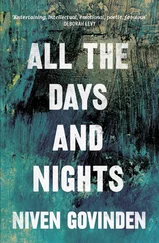Peter Stamm - All Days Are Night
Здесь есть возможность читать онлайн «Peter Stamm - All Days Are Night» весь текст электронной книги совершенно бесплатно (целиком полную версию без сокращений). В некоторых случаях можно слушать аудио, скачать через торрент в формате fb2 и присутствует краткое содержание. Год выпуска: 2014, Издательство: Other Press, Жанр: Современная проза, на английском языке. Описание произведения, (предисловие) а так же отзывы посетителей доступны на портале библиотеки ЛибКат.
- Название:All Days Are Night
- Автор:
- Издательство:Other Press
- Жанр:
- Год:2014
- ISBN:нет данных
- Рейтинг книги:3 / 5. Голосов: 1
-
Избранное:Добавить в избранное
- Отзывы:
-
Ваша оценка:
- 60
- 1
- 2
- 3
- 4
- 5
All Days Are Night: краткое содержание, описание и аннотация
Предлагаем к чтению аннотацию, описание, краткое содержание или предисловие (зависит от того, что написал сам автор книги «All Days Are Night»). Если вы не нашли необходимую информацию о книге — напишите в комментариях, мы постараемся отыскать её.
All Days Are Night — читать онлайн бесплатно полную книгу (весь текст) целиком
Ниже представлен текст книги, разбитый по страницам. Система сохранения места последней прочитанной страницы, позволяет с удобством читать онлайн бесплатно книгу «All Days Are Night», без необходимости каждый раз заново искать на чём Вы остановились. Поставьте закладку, и сможете в любой момент перейти на страницу, на которой закончили чтение.
Интервал:
Закладка:
After her first cup of coffee she slowly came around, and under the shower her body knitted itself together to what it was. She vaguely remembered the time she was still growing. Her hips widened, her breasts deepened. It was like one long inhale, a picking herself up. Now she exhaled, for a long time she had done nothing but exhale, sometimes she had the sense of not having any more air in her and still having to go on exhaling.
Every other day or so, Gillian had to go to her doctor to get her dressings changed. In the waiting room, the other patients avoided her eyes. When the doctor said the wounds were healing well, it sounded to her like mockery. After the dressing had been changed, she often went for a drive around the city. Behind the wheel she felt invisible, only waiting at a light sometimes she noticed the driver of a car in the next lane eyeing her and quickly looking away when she turned. She was drawn to empty spaces, drove to the industrial park on the edge of the city, parked her car at the soccer stadium. There was no one around, only a couple of building machines parked on the gravel. Around the perimeter was a tall wire fence, the gate stood open. She walked in, climbed a wide flight of steps. The stadium was much bigger than it seemed from outside. The stands were empty, tiers of colored seats, blue, orange, gray, and green. She stood there for a while, looking down at the playing surface and trying to imagine the scene when there was a game on and the stands were full of spectators. Another time, she drove up to the top floor of a multistory parking garage. The morning had been dry, but it started raining again at midday. The walls of the garage were cement, with wide spaces through which a powerful wind blew. Gillian got out and made her way among the handful of parked cars. She spun on her own axis, made wide sidesteps as in fencing classes at drama school, leaps forward and back. She occupied the space, as their speech tutor had taught them to do, put out the flat of her hand as though to push the walls away. She accompanied this with long, drawn-out hissing. She felt excited, she didn’t even know why. The space seemed to be too big, it afforded no resistance. In little pattering steps she ran to one of the openings and looked out at the industrial buildings, at the multilane highways packed with traffic bordered by trimmed poplars, at the mountain away in the distance, dimly visible through the downpour. She felt cold.
When she returned to her Mini, she saw a man sitting in one of the parked cars. He sat there motionless. Their eyes met, and Gillian wondered if he had been watching her entire performance.
The day before the second operation, a Sunday, Gillian visited her parents. She hadn’t seen her mother since the accident. When her mother opened the door and saw her, she turned aside and started crying. Her father stepped up and with an expression of annoyance pushed her mother out of the way.
Come on in, he said.
Her mother said lunch was almost ready, and she disappeared back into the kitchen. Gillian followed her.
The sounds of silverware on the plates seemed so deafeningly loud that Gillian could hardly hear what her parents were saying. The two aged faces contorted themselves to ugly grimaces as they chewed their food, Gillian looked down at her plate, broke up her food in small pieces, which she swallowed, almost without chewing them.
Aren’t you hungry at all?
What’s that?
You’re hardly eating anything.
I’m not hungry. Gillian put down her knife and fork and stood up. I’ll be back in a minute.
As she was shutting the bathroom door behind her, she saw her father get up to refill his plate.
She sat on the toilet and waited. It was cold in the house, she was shivering. Her father kept the thermostat way down, her mother had whispered to her in the kitchen. Her father hadn’t finished eating, but her mother had already started to clear the table. They had their coffee in the living room. Her father read the newspaper, her mother was sitting next to Gillian in such a way that she couldn’t look at her. Gillian looked at her mother’s hands as she poured coffee, passed her a cup, took one herself, wizened hands too brown for the early season, with age spots and half a dozen rings on her fingers. As a young woman, her mother had been beautiful. Gillian wondered how she coped with the loss of her beauty, and if it was easier when it happened gradually and not just like that. She had read somewhere that most people had a completely false self-image, thinking of themselves as slimmer, younger, and more attractive than they really were. Perhaps to herself her mother was still the beautiful young woman in her wedding picture that stood on the sideboard. Certainly, she still looked after herself, but the futility of her efforts only made her decline sadder.
You look like you’ve put on weight, said her mother.
Gillian stayed longer than she had meant to. She went out to the garden with her father, and he showed her a couple of bushes he had planted. Later on, all three of them were in the living room again, reading. Gillian went to lie on the bed in her old room. Her mother was in the kitchen, getting dinner ready. Her father wandered around, perhaps he was looking for something. The times Gillian had visited him in his workshop, he had been a different man altogether, full of energy, choleric, but often in a good mood and generous. Whereas at home, he resembled a wounded animal, looking for a place to hide.
And you’re sure it’s all right if we go skiing next week? her mother asked.
Oh, yes, said Gillian, it’s not a dangerous operation. And you’ll see my new face soon enough.
Then why don’t you go somewhere, to the mountains or the sea? asked her mother. You’ve got time.
By myself? said Gillian, and carried the glasses into the living room.
She set the table. When she came back to the kitchen, her mother looked at her apprehensively, but Gillian didn’t say anything else. After dinner, they watched the news.
I’d better go now, said Gillian.
Her parents made no effort to keep her. They saw her to the door, her mother hugged her, her father shook hands. Break a leg, eh, said Gillian, and climbed into her car. When she had turned, she looked at the house again. The door was shut.
That evening Gillian checked her e-mails, but there was nothing for Miss Julie.
The text Hubert sent her after showing her his pictures had offended Gillian. He had asked if she was disappointed. After that she didn’t write for two weeks, and he hung back as well. Matthias asked her what the matter was, but she just shook her head and said she had a lot to do, half the editorial team was away on autumn breaks.
Finally she wrote him an e-mail that accused him of exploiting her. Not every woman you lure into your studio will strip for you.
Hubert answered at once, it was as though he had been waiting for her to write. He was friendly but provocatively calm, wrote that he hadn’t asked her to model for him, though he admitted he had entertained the possibility. He had decided basically not to continue with the series of nudes and to start on something new, but it might be interesting to have one last go. It would be different anyway, he wrote, seeing as you’re not a complete stranger to me, and I wouldn’t want to photograph you but paint you from life. Might you be interested?
What happens with the picture? asked Gillian without a salutation or greeting.
I’ll give it to you, replied Hubert.
I can hardly come home with a nude painting of myself, wrote Gillian. He wrote: I wasn’t thinking in terms of a nude.
Unusually, the program was wrapped on a Monday, and Gillian got Tuesday off. When she woke up, Matthias was standing by the window, a cup of coffee in his hand.
Читать дальшеИнтервал:
Закладка:
Похожие книги на «All Days Are Night»
Представляем Вашему вниманию похожие книги на «All Days Are Night» списком для выбора. Мы отобрали схожую по названию и смыслу литературу в надежде предоставить читателям больше вариантов отыскать новые, интересные, ещё непрочитанные произведения.
Обсуждение, отзывы о книге «All Days Are Night» и просто собственные мнения читателей. Оставьте ваши комментарии, напишите, что Вы думаете о произведении, его смысле или главных героях. Укажите что конкретно понравилось, а что нет, и почему Вы так считаете.
